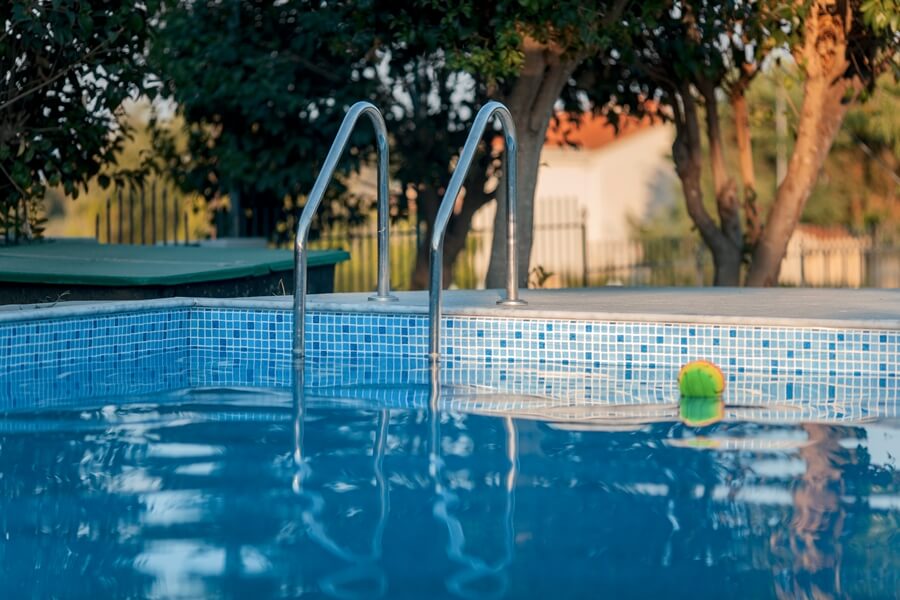Oh, you just noticed the water level is a couple of inches lower than it should be. It could be due to evaporation or a leak. Monitor your pool’s water level regularly whenever you suspect water loss due to a leaking pool.
Well, now what?
Many people would suggest not calling a leak detection company for your pool. Sometimes it can help you, but not always. Water loss prevention is not as easy a task as you might think.
Every homeowner is a self-proclaimed plumber of their home. We agree because we are among them. Luckily, we are seasoned swimming pool installation, repair, and maintenance experts, so we understand how difficult it can be for individuals to find signs of leaking pools.
Is Pool Leaking Or Is It Just Evaporation?
First, you must know how to figure out if the pool is leaking or if it is just evaporation. If you have a small doubt about a pool leak, then try some DIY methods to quickly find the leaks. You can also hire a professional to detect the leak. If the leak is minor, you can fix it yourself. But if the leak is severe, it is best to hire a professional to fix it. Generally, from the very first sign of trouble, you should contact a pool repair company to prevent future damage to your property and pool.
Do you truly believe that only water loss is the major cause behind leaky pools? If not, what else can be the cause? Are there any other reasons why pools leak? How can leaky pools be prevented?
Hold on…we’re here for your answers.
So, what is the main cause of pool leaks?
Ever noticed your pool losing a bit of water? Don’t panic – it’s totally common!
Here’s the clear thing to jotted down: under regular conditions, pools tend to lose about 2 to 2.5 cm of water per week. Blame it on evaporation, wind stirring things up, filter cleaning, overflow, splashing, and yep, even water clinging to swimsuits.
If your pool’s water loss falls within this range, no need to worry! But if you’re seeing a drop of more than 2.5 cm, uh-oh, you might have a leak brewing. A serious expense can result from this.
Watching out for other signs of a leaking pool can help you stay ahead of future damages and massive water loss. Furthermore, you might observe stains on the pool walls or detect an unusual smell coming from the water. That’s why detecting pool issues early can save you money in later years. Perhaps these common symptoms of leaking pools can help you easily uncover any vague assumptions about leaks.
- Increase in water bills
- Lead to chemical imbalances
- Cause cracks in pool decking
- Result in major leaks
- Lead to structural damage
- Experience sand in your swimming pool
- Notice grass around the area remains soggy
- Witness shifting pool tiles
- Encounter algae growth in the pool
- Experience filter clogging or filter pressure issues
- Encounter broken pipes
- Notice damaged pool liners
- Observe standing water
- Encounter mechanical issues
- Notice a decreased water level
- Experience ground movement
So, your pool can float due to your negligence towards swimming pool repair and maintenance from time to time. You must be wondering how this could be possible, right? Generally, swimming pools are heavy in weight. However, they can indeed float due to ground movement. Basically, this happens because of hydrostatic pressure. Leaving your pool draining unattended can cause the water to push your pool upwards and out of the ground. Regular pool maintenance is essential for keeping a pool afloat.
How can pool leaks be prevented?
- Protect your pool from excessive evaporation caused by sun and wind exposure by covering it when not in use. Consider using a thermal pool cover to minimize this effect.
- Clean the system regularly to prevent filter problems such as clogging or reduced pressure. Check the filter frequently to ensure it is functioning properly.
- Monitor the water level and refill as needed. If the water level consistently drops by more than 2.5 cm per day, contact the pool maintenance team for assistance.
- Regularly inspect the pool basin for cracks in its structure to prevent fissures. Cracks can lead to structural leaks in the pool’s piping system, requiring professional assistance for detection and repair. Conduct routine inspections to maintain a safe swimming environment.
- Prevent hydraulic damage by inspecting PVC pipes for leaks regularly. This type of fault is challenging to manage through DIY methods, so seek professional help for accurate detection and resolution. Additionally, consider pressure testing the pipework section by section to identify leaks. If a leak is detected, choose the most appropriate course of action to replace the faulty pipes.
In any case, consulting a professional is essential to determine the best solution for your pool repair needs.

